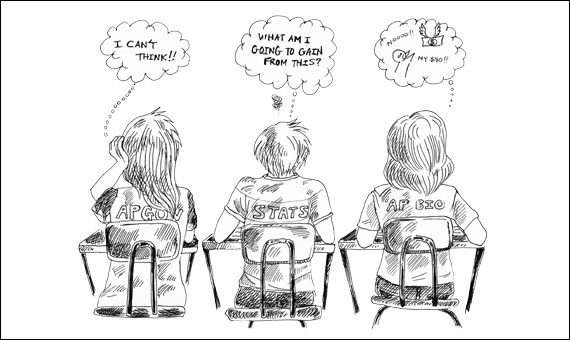
“I don’t love them, but I don’t hate them,” senior Mitchell Tam remarks.
Tam’s opinion of the yearly AP examinations mirrors many other Aragon students’ views on the test. Depending on the student, the AP test can either be an extremely stressful experience or just another final exam for a class.
Junior Ashley Koh speaks of her anxiety when she thinks about taking an AP test for the first time. “It is crazy. It’s hard to find time to study because teachers keep giving me too much homework and I’m basically cramming. I feel panicked and my brain hurts when I think about AP tests,” she says.
College Board, the company supplying the tests, continues to encourage students to take Advanced Placement classes to prepare to succeed in college. Its website states that the AP course and test are ultimately beneficial in that they “adhere to high academic disciplinary standards for proficiency and excellence.”
Yet there still exists the question of how “beneficial” AP tests really are to a striving student. Neil Mercado, a junior, agrees that the AP examination may be necessary to test what students have learned throughout the year, but says, “I’m probably going to cram for it and forget about it in a couple of years.”
Senior Alex Zuniga states of the AP test, “[The test] can be a bit long, but in the long run, it’s worth it. Getting credits is pretty much one of the main reasons why I’m taking it.”
Linh Luu, also a senior, expands on the subject of AP credits. “It’s nice that high school students can take classes for college credit at a decent price compared to what college students pay for a course nowadays,” she says.
As a recent Aragon alumnus, Alice Liu remembers the hype behind the AP exams. She explains, “I think that AP testing was beneficial, but probably not in the way that it’s pitched to us. Even if you did take an average or even above average amount of APs in high school, it’s not really enough to lessen the cost by a whole lot, because your college might not give you credit towards your major even if you pass out of certain classes.”
Jim Coe, assistant principal, stresses that every college or university has its own policy of acceptance. For students taking the AP exam, receiving a score of three, four, or five is passing; a five demonstrating clear mastery of the subject. Coe says, “AP exams used to have more merit, but it all depends on the college policy now. A student could have taken ten AP exams and not have them worth anything at all at a college.”
Although scores on AP tests are typically important, especially when a college considers a student’s major, the AP exam’s value does not have to be determined merely by a student’s scores. Coe introduces the true benefit of the big, end-of-the-year AP assessment by focusing on the student’s knowledge of AP course curriculum. “The real value comes in hour-by-hour, day-to-day activities, where a student learns at a college level and really develops. Teachers make sure to go to conferences to calibrate goals and content of courses so that students can really learn and become a college level student,” he explains.
Richard Serrao, an AP Calculus teacher, gives an analogy for the AP course and its exam. “Why would you rehearse for a whole year and not stage the production?” he asks, indicating his belief that taking the AP test is definitely a worthwhile experience.
Kristin Chan, a 2010 Aragon alumnus, believes AP testing is essentially a reality check for most high school students. “The only benefit of studying for AP tests was that it mentally prepared us for college finals,” she comments. “The course load is very heavy in college, similar to the AP. High school AP teachers are like training wheels on a bike…once they’re gone, you’re on your own. In college, you are responsible for learning the material by yourself.”
Having graduated from Aragon in 2004, Guan Wang has also graduated from Caltech and additionally works as a private tutor. “The true value of the AP test…has nothing to do with the test,” he says. “Despite what the College Board says, most of you will not use the vast majority of the facts you learned in AP classes ever again. But that’s okay. If facts were the most important part of learning, your English teacher would be replaceable by a dictionary and your Math teacher by a calculator.”
Wang concludes, “Learning how to think about and deal with problems you’ve never seen before is, in my opinion, what is truly valuable about the AP program, because those skills will be useful to you no matter what you do in the future.”



